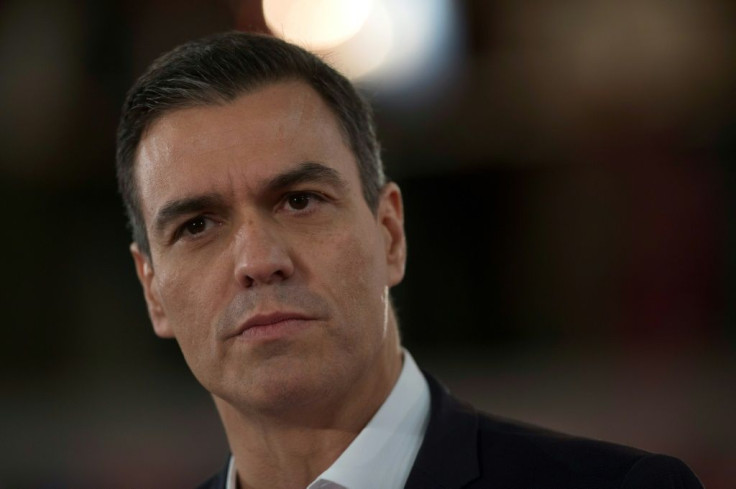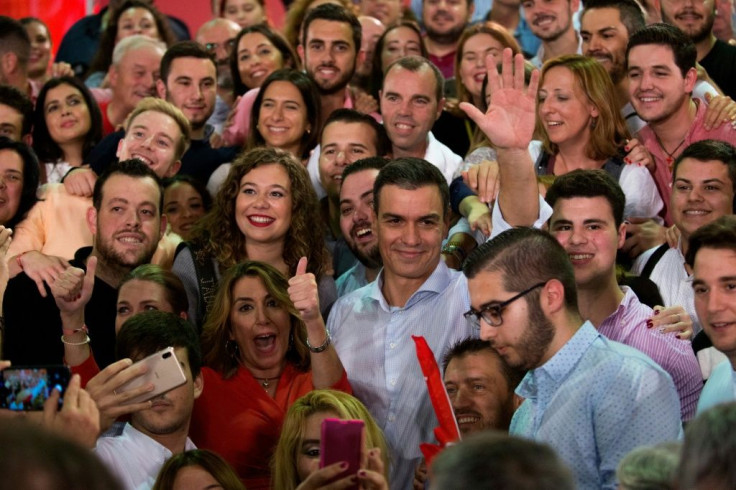Pedro Sanchez, Stubborn Survivor Of Spain's Political Gridlock

A former basketball player once dubbed "Mr Handsome" for his boyish good looks, Spanish Prime Minister Pedro Sanchez is a political survivor whose rollercoaster career has played out to the backdrop of chronic instability.
And Sunday's general election provided yet another twist, with the Socialist leader emerging a winner but weakened from Spain's fourth vote in as many years.
Although his Socialists topped the ballot, they ended up losing three seats in an election Sanchez had called to strengthen his hand.
But it backfired, with the far-right Vox becoming the parliament's third-largest faction in a difficult blow for this Madrid-born economic who emerged from obscurity in 2014 to seize the reins of Spain's oldest political party.
"He is a player, ready to take risks and sometimes reckless," said Jose Ignacio Torreblanca, of the European Council on Foreign relations.
Always immaculately suited and booted, this telegenic 47-year-old who likes to go running and looms over his rivals at 1.90 metres (6 foot, 2 inches) tall, has made a name for himself as stubbornly tenacious.
Three years ago, he was written off as politically dead, ousted as party chief after leading the Socialists to their worst-ever defeats in 2015 and 2016.
Just over six months later, however, he unexpectedly won his old job back in a party primary election after a cross-country tour in his old car to rally support.
And by June 2018, he had taken over as premier after an ambitious play that toppled conservative PP leader Mariano Rajoy in a no-confidence vote.

But the fragile alliance that catapulted him to power cracked in February, with the Catalan separatist lawmakers who had supported him rejecting the budget and triggering fresh elections in April, Sanchez's first as prime minister.
Although his Socialists won, they fell short of an absolute majority, prompting Sanchez to call yet another vote, which analysts say is likely to deepen the deadlock.

A leap year baby who was born in Madrid on February 29, 1972, Sanchez grew up in a well-off family, the son of an entrepreneur father and a mother who worked as a civil servant.
He studied economics in the Spanish capital before getting a Master's degree in political economy at the Free University of Brussels and a doctorate from a private Spanish university.
Married with two adolescent daughters, Sanchez has been quick to cultivate his public image as a family man, describing himself on his Twitter handle as "Spanish prime minister and father".
Politics, though, was always his passion.
He joined the Socialist party in his early twenties, then served as an opposition councillor in Madrid from 2004 to 2009, after which he entered parliament as a lawmaker during the Zapatero administration.
Earlier this year, Sanchez detailed his triumphs in an autobiography called "Resistance Manual", the first to be published in Spain by a sitting premier.
He pledged to donate all profits from its sale to the homeless.
After taking over as premier, Sanchez implemented a series of eye-catching measures, appointing a cabinet with a majority of women, taking in migrants from the Aquarius rescue ship, and raising the minimum wage by 22 percent after years of austerity.
And last month, he finally made good on a pledge to exhume the body of late dictator Francisco Franco from a grandiose state mausoleum, reburying it in a more discreet grave in a country still conflicted over the dictator's decades-long regime.
But his premiership has been overshadowed by the Catalan separatist crisis, which in October erupted into mass protests that turned violent after Spain's top court jailed nine regional leaders over a failed 2017 independence bid.
Images of Barcelona in flames ultimately weakened Sanchez and played into the hands of Vox, whose hardline stance on Catalan separatism prompted the biggest surge in support for the far-right since Franco's death in 1975.
avl-hmw/pmr/aph
© Copyright AFP 2024. All rights reserved.





















